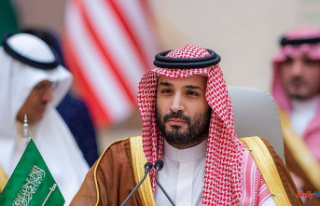Concerns in Bavaria about the energy crisis are great. Markus Söder now wants to join forces with other southern countries. And the Greens are moving on the subject of nuclear power - but only a little.
Munich (dpa / lby) - Bavaria's Prime Minister Markus Söder (CSU) wants to set up his own South Prime Ministers' Conference with his colleagues from Rhineland-Palatinate, Hesse and Baden-Württemberg. The aim should be to ensure the energy supply in the southern federal states during the energy crisis, as Söder said on Tuesday after a meeting of his cabinet in Munich.
As a heavily industrialized federal state, Bavaria is particularly affected by the impending gas shortage, said Söder. It is foreseeable that federal plans should primarily benefit the northern federal states. Southern connections were deleted in the preliminary plans for a German hydrogen network, said Söder.
Söder again called for a longer term for German nuclear power plants, at least until mid-2024. "It's time not to constantly throw smoke screens," said the CSU boss. In addition, the Bavarian gas storage tanks would have to be filled more - the filling level should not be below the national average. In order to speed up the construction of the power line, the state government wants to increase the staff in the approval authorities by up to 40 employees - this is intended to speed up the approval process.
Bavaria's Economics Minister Hubert Aiwanger (Free Voters) argued that gas could be saved by using nuclear power. "Then we could feed the gas that we're now using for electricity into the storage tanks and wouldn't have to take cold showers in winter." On Deutschlandfunk he had previously called for the reactivation of nuclear power plants that had already been shut down - a total of six nuclear power plants were to continue to be operated temporarily.
The leadership of the Bavarian Greens does not rule out extending the life of the three remaining nuclear power plants - but only for a stretched operation of a few weeks. "The main thing for us is to ensure security of supply," says a statement by state parliamentary group leader Ludwig Hartmann, from which the "Augsburger Allgemeine" was the first to quote. If the intensified stress test shows that individual nuclear power plants are necessary "in extreme cases" to maintain the power supply and grid stability, "depending on the plant, we have to react accordingly". The state chairman Thomas von Sarnowski made a similar statement.
Hartmann and von Sarnowski pointed out that the risk of supply bottlenecks in winter is greater in Bavaria than in other federal states. "Bavaria must be given special consideration in this test because the Bavarian government has made us completely dependent on Russian gas, overslept the expansion of wind and solar energy and boycotted the important grid expansion," said Hartmann. "That makes us the problem child of the federal government and puts us in the situation that - depending on the result of the stress test - we may have to leave a high-risk technology online for a few weeks to bridge the gap." We are now waiting for the results of the stress test in the coming weeks. "After that we decide."
"In the extreme case", a stretching operation of Isar 2 must also be checked, no extension of the term, said von Sarnowski. This would mean "that the existing fuel elements would continue to be used for a few months without additional nuclear waste being generated".
The last three reactors actually have to be shut down by December 31st. In the case of a stretching operation, the power plants would first be throttled so that they can then be operated with the existing fuel rods beyond the turn of the year.
With the help of an agreement in principle signed on Tuesday, Aiwanger wants to accelerate the expansion of solar and other renewable energies in Bavaria. In essence, it is a question of better coordinating those involved in order to make it easier to connect the systems to the grid, said the minister. In addition to Aiwanger, the signatories to the memorandum of understanding include the Bayernwerk and other network operators, district and municipal councils, the farmers' association and the Federal Association of the Solar Industry.












